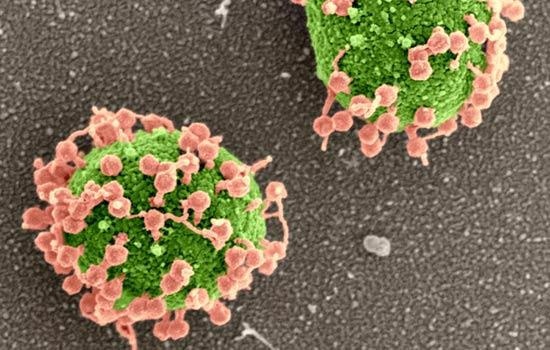A preclinical study performed by Monash University researchers discovered that utilizing a combination of phages and antibiotics to treat bacterial infections may be considerably more successful than using the drugs separately.
 Colorized scanning electron microscopy image of phage FG02 (orange) infecting Acinetobacter baumannii bacteria (green). Image Credit: Denis Korneev.
Colorized scanning electron microscopy image of phage FG02 (orange) infecting Acinetobacter baumannii bacteria (green). Image Credit: Denis Korneev.
The discovery, which was published in EBioMedicine, has far-reaching implications for antibiotic-resistant bacterial infections, which are considered one of the greatest risks to world health by the World Health Organization (WHO).
Phage therapy is the treatment of bacterial infections with bacterial viruses.
In recent years, there has been a growing interest in phage therapy as a possible cure for antibiotic-resistant infections.
However, questions remain around the efficacy of phage therapy as a treatment option. This has been obfuscated by the fact that clinical phage therapy is almost always administered alongside antibiotics, making it difficult to determine the efficacy of phage therapy.”
Dr Jeremy Barr, Study Senior Author, Centre to Impact AMR, School of Biological Sciences, Monash University
The researchers employed a phage-antibiotic combination against Acinetobacter baumannii, the world’s most antibiotic-resistant superbug.
Researchers previously shown that phages can kill antibiotic-resistant A. baumannii, but scientists also discovered that phage-resistant mutants evolved, similar to how antibiotic resistance evolves with chronic antibiotic treatment, phage-resistance also occurs.
We found that while A. baumannii rapidly became phage-resistant, in doing so they were also resensitized to the same antibiotics they use to resist. Applying this knowledge, we conducted a pre-clinical trial using animal models and found that the combined use of phages and antibiotics led to significantly improved treatment outcomes than either antibiotics or phage therapy alone.”
Fernando L. Gordillo Altamirano, Study Lead Author, School of Biological Sciences, Monash University
The findings, according to Dr Barr, revealed the mechanism by which the combination of these two agents resulted in a superior therapy effect.
We have been able to confirm that, even in complex living systems, treatment with our characterized phages can reliably steer bacteria towards a phage-resistant variant that is re-sensitized to antibiotics.”
Dr Jeremy Barr, Study Senior Author, Centre to Impact AMR, School of Biological Sciences, Monash University
The effectiveness of the combined therapy in vivo, according to the researchers, was owing to the formation of phage-resistant mutants with antimicrobial resensitization, accompanied by targeted treatment with the resensitized antibiotic.
“We believe further research in the field is likely to lead to the discovery of innovative uses of combination therapies using phages and antibiotics in combination, rather than proposing phages as a substitute to antibiotics,” Dr Barr concluded.
Source:
Journal reference:
Gordillo Altamirano, F. L., et al. (2022) Phage-antibiotic combination is a superior treatment against Acinetobacter baumannii in a preclinical study. EBioMedicine. doi.org/10.1016/j.ebiom.2022.104045.